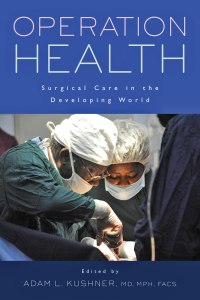Gust post by Adam L. Kushner
I know someone who needed surgery. He was born by emergent C-section and had stomach surgery at 2 months and an appendectomy at 23.
He is alive today because of surgery. I am that person.
Throughout much of the world, the lack of surgical care leads to death or disability for millions of men, women, and children. Yet despite that reality, the global health community has not recognized the urgent need for surgical care. Surgery and anesthesia are integral to the treatment of traumatic injuries and obstructed labor. Many infectious complications need surgery. Surgery is often the best or only treatment for many cancers. But millions around the world lack access to such care.
 In 2013, I began teaching a course at the Johns Hopkins Bloomberg School of Public Health entitled “Surgical Care Needs in Low and Middle Income Countries.” The course covers surgical epidemiology, women’s and children’s health, and conflict and disasters. My new JHU Press book, Operation Health: Surgical Care in the Developing World, came out of that course. It covers care rarely discussed within global health: surgery and anesthesia. The chapters begin with a personal vignette; then, experts from around the globe present case studies, best practices, and topic overviews. Chapters tackle subjects such as C-sections in Ethiopia, clubfoot in Nepal, trauma in Tanzania, anesthesia in Ghana, and laparoscopy in Mongolia. The book, which is written for public health and medical students, is also accessible to the general reader.
In 2013, I began teaching a course at the Johns Hopkins Bloomberg School of Public Health entitled “Surgical Care Needs in Low and Middle Income Countries.” The course covers surgical epidemiology, women’s and children’s health, and conflict and disasters. My new JHU Press book, Operation Health: Surgical Care in the Developing World, came out of that course. It covers care rarely discussed within global health: surgery and anesthesia. The chapters begin with a personal vignette; then, experts from around the globe present case studies, best practices, and topic overviews. Chapters tackle subjects such as C-sections in Ethiopia, clubfoot in Nepal, trauma in Tanzania, anesthesia in Ghana, and laparoscopy in Mongolia. The book, which is written for public health and medical students, is also accessible to the general reader.
I cannot say exactly what led me to train as a surgeon and practice in the developing world. What I do know is that to prepare to practice overseas, I also obtained a Master of Public Health degree from Johns Hopkins in the middle of my surgical training. At that time—1998—there was almost no mention of surgery within public health. I remember knocking on dozens of doors, asking to join public health research projects that included surgical care. Time after time no one could help me.
I was not discouraged. I felt there must be a need for surgical care and finished my surgery training. For a decade, I practiced and taught in countries ranging from Iraq to Indonesia, Sierra Leone to South Sudan, and Niger to Nicaragua. My public health training had included much on what was needed to address conditions as HIV, tuberculosis, and malaria. The reality that I began to see was that surgical care was also needed. I treated women in obstructed labor; children with appendicitis and typhoid perforations; adults with fractures, hernias, and cancer. Many of these patients presented with late stage disease. I began to wonder how many patients were not seeking care, how many were dying in their villages and fields. How many were not as fortunate as I.
In 2008, along with local colleagues, we began documenting deficiencies in providing surgical care. A study in Sierra Leone showed no oxygen, limited sterile gloves and eye protection, and only 10 surgeons for a population of 6 million. We showed that Sierra Leone hospitals in 2008 were worse off than U.S. Civil War hospitals in 1864. Later, we conducted population-based surveys of surgical need in Sierra Leone, Rwanda, and Nepal. Estimates showed that up to 25% of the populations needed an operation, and that 33% might have died due to a lack of surgical care.
As the field of global surgery matures within global health, the question is not should we provide surgical care but how. Operation Health looks at this issue and provides some ways forward.
Adam L. Kushner is an associate in the Department of International Health at the Johns Hopkins Bloomberg School of Public Health and a lecturer in the Department of Surgery at Columbia University. The founding director of Surgeons OverSeas, he has offered surgical care to patients in conflict, post-conflict, and disaster settings around the world. His book, Operation Health: Surgical Care in the Developing World, was published this month by JHU Press.

